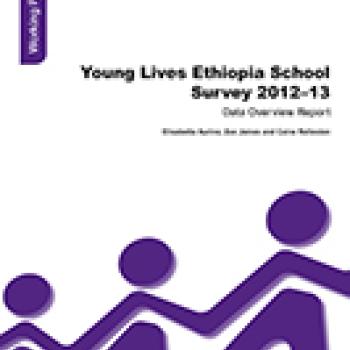
This report provides an overview of the second Young Lives school survey in Ethiopia, conducted at the beginning and end of the 2012-13 academic year with nearly 12,000 primary-school children studying in Grades 4 and 5. The survey was designed to allow analysis of what shapes children's learning and progression over a school year and the report gives a baseline descriptive report of the data.
This second school survey extended beyond the 20 Young Lives study sites to include 10 newly selected sites in the developing regions of Somali and Afar, where historically poor access to and participation in services, including education, is of particular concern to government, donors and NGOs. In each of the total of 30 sites, all schools, both government-owned and non-government-owned, were included in the sample, enabling a perspective on the growing phenomenon of private schooling in Ethiopia.
Pupils in Grade 4 and Grade 5 were assessed in the core curricular domains of maths and reading comprehension at the beginning and the end of the school year. Data were also collected at the teacher, class, principal and school levels, in order to analyse the determinants of learning progress during a single school year, i.e. providing a "value-added" perspective (not included in this report but to be covered in forthcoming publications).
See also: Ethiopia School Survey 2012-13: Data Report Summary

This report provides an overview of the second Young Lives school survey in Ethiopia, conducted at the beginning and end of the 2012-13 academic year with nearly 12,000 primary-school children studying in Grades 4 and 5. The survey was designed to allow analysis of what shapes children's learning and progression over a school year and the report gives a baseline descriptive report of the data.
This second school survey extended beyond the 20 Young Lives study sites to include 10 newly selected sites in the developing regions of Somali and Afar, where historically poor access to and participation in services, including education, is of particular concern to government, donors and NGOs. In each of the total of 30 sites, all schools, both government-owned and non-government-owned, were included in the sample, enabling a perspective on the growing phenomenon of private schooling in Ethiopia.
Pupils in Grade 4 and Grade 5 were assessed in the core curricular domains of maths and reading comprehension at the beginning and the end of the school year. Data were also collected at the teacher, class, principal and school levels, in order to analyse the determinants of learning progress during a single school year, i.e. providing a "value-added" perspective (not included in this report but to be covered in forthcoming publications).
See also: Ethiopia School Survey 2012-13: Data Report Summary

